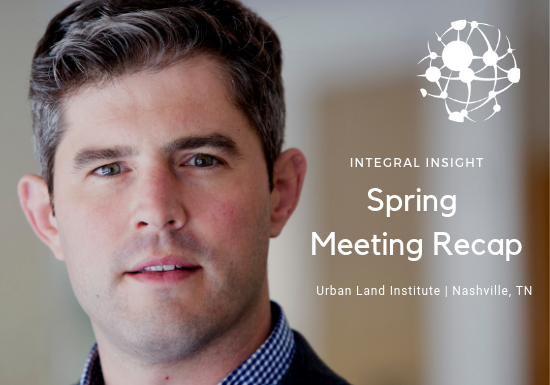
Principal Brenden McEneaney was invited to Urban Land Institute’s Spring Meeting in Nashville. Here are some of his key takeaways from the thought leaders in real estate and urban development.
The Music Hasn’t Stopped…Yet
The US industry has been in “extra innings” this cycle for a while. Leading economists project stable, average growth through 2021 with some contraction thereafter. A recession isn’t in the 6-month forecast, but 18+ months out, the risks go up. Changing Fed policy, China’s slowing growth, potential for a unicorn bubble – these could all tip the scales. Industrial/Logistics continues to do better and Retail continues to lag, drive to some degree by Amazon 2-hour delivery pressure. Specific forecasts are highly regional and sector specific. Full data from the Forecast is here.
Climate Matters
Several panels noted the increasing emphasis on climate action. The Task Force on Climate Financial Disclosures (TCFD) continues to push for transparency for banks and investors about climate risks, and real estate developers are increasingly considering climate risks in their asset allocations or their capital build-out strategies. Miami Beach – which floods at high tides on sunny days – has worked with ULI to take dramatic steps towards resilience. A recent resilience bond got an AA+ rating from S&P, as one of the most robust plans to address climate risk of any U.S. local government. During the conference, NYC passed a sweeping Climate Mobilization Act that would assess a carbon tax on many private sector buildings.
Housing the Homeless
Nashville is yet another example of the meteoric resurgence of core downtown business districts across the US. From zero residential zoning until the mid-90’s to almost 12,000 residents and a booming development pipeline today, the City has reversed some of it’s sprawl trends. Also like many cities, this has impacted affordability and homelessness in a very public way. I was invited to join the Responsible Property Investment Council, a ULI sub-group that focuses on People, Planet, and Profit in the context of real estate development. There I heard about a new solution that engages private sector landlords to house homeless people through a new model the blends philanthropy with profit interest. The Lotus Campaign has purchased its first property in Charlotte and works with local landlords to place homeless, many of whom can pay rent but can’t pass a credit check, in vacant units.
It was great to experience Music City during this interesting boom period, surrounded by real estate investors, developers, and many, many electric scooters. It will be interesting to see if Nashville can preserve its unique culture among the flood of new investment that mimics other core downtowns across America. As always, the industry is driven by risk and reward, and we should continue to frame our work in that language as a context for driving forward low-carbon buildings and communities.
About Urban Land Institute
Urban Land Institute is the oldest and largest network of cross-disciplinary real estate and land use experts in the world. ULI is its members. Through our members’ dedication to the mission and their shared expertise, the Institute has been able to set standards of excellence in development practice.
